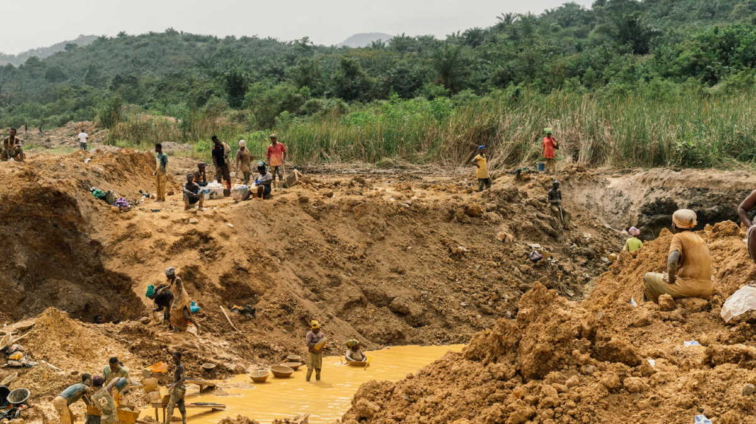The inhabitants of Gbani a community in the Upper East region, are at risk of non-cancer effects of mercury.
That is the conclusion of joint research by the Chemistry Department of the Kwame Nkrumah University of Science and Technology and Aarhus University, Denmark.
The research published in the international journal Chemosphere found children were at a higher risk.
Mercury pollution has been a big problem in many artisanal gold mining communities in the world, especially in developing countries such as Ghana.
This study sought to assess the potential risk of mercury pollution in soils at Gbani, an artisanal gold mining community in Ghana.
For the study, 237 soil samples were collected from within 0-10 cm depth, from active mining sites in or near residences, two transects in the community, waste soil from mining processing and the surroundings of the community.
The researchers found average mercury soil levels were highest in mining sites and low in the surroundings of the communities.
“The average mercury concentrations were 71 mg Hg/kg in active mining sites, and more moderate (2.7 mg Hg/kg) along transects through the community.
“The soils were classified as being moderately to extremely severely contaminated with mercury,” Opoku Gyamfi, a PhD candidate and lead scientist elaborated.
The research showed the contamination of soil by mercury is highest at residential facilities and decreases through the community to the outskirts covered by vegetation.
This has implications for water quality and food grown on the soil and fish found in the water bodies in the area.
Mr. Opoku Gyamfi recommended that mercury-free extraction methods, such as the use of borax, should be employed in extracting gold.
“In the interim, miners can resort to the use of retorts that will capture the mercury,” he added.
Exposure to indoor mercury vapour
A related publication to assess human risk exposure to indoor mercury vapour in Gbani also found that the mercury-gold amalgam was burnt in kitchens and sometimes bedrooms.
The inhalation of mercury vapour can pose health risks.
Mercury vapour inhalation can produce harmful effects on the nervous, digestive and immune systems, lungs and kidneys, and may even be fatal.
The levels found exceeded the WHO average concentrations of mercury in indoor air.
“Threshold limits are exceeded greatly when the average concentrations of mercury in indoor air at Gbani are compared with international maximum recommended values; annual time-weighted average of 1000 ng m3 by WHO (World Health Organization (WHO), 2000),” the paper reported.
The burning is done to expel the mercury and get raw gold. Again, some store their mercury stocks in bedrooms.
“The burning of amalgam releases mercury into the atmosphere which contaminates the air. Some of the mercury in air may deposit onto soils whiles some are carried by wind currents to contaminate air, soil and water at other places.
“The level of mercury determined can pose non-cancer health risk to the inhabitants of the community,” Opoku Gyamfi warned.
Latest Stories
-
Police exhume multiple human remains in Central Tongu shrine
1 hour -
Ramaphosa opposes Trump’s 30% tariff on South Africa
2 hours -
First malaria treatment for babies approved for use
2 hours -
Alcaraz masterclass ends Norrie’s Wimbledon hopes
2 hours -
TOR throws light on premix composition amid sector reforms at stakeholder engagement
2 hours -
TOR dismisses claims of unchecked fuel dispatches, highlights strict multi-agency verification process
3 hours -
MPs vote to establish independent regulator for men’s football in England
3 hours -
Ghana abstains from UN vote on LGBTQ+ rights amid push for criminalisation
3 hours -
Jota’s car was probably speeding before fatal crash, Spanish police say
3 hours -
CJ’s powers too excessive, prone to political abuse – Prof. Prempeh calls for urgent reforms
3 hours -
Mahama inaugurates committee to oversee handover of UGMC to UG
3 hours -
Joao Pedro double sends Chelsea into Club World Cup finals
3 hours -
Former Arsenal sporting director Edu joins Nottingham Forest
3 hours -
KNUST Animal Science Dept trains experts to enhance poultry productionin Ghana
4 hours -
Newmont Ahafo South mine allocates $34m for road construction between 2025 and 2028
5 hours

